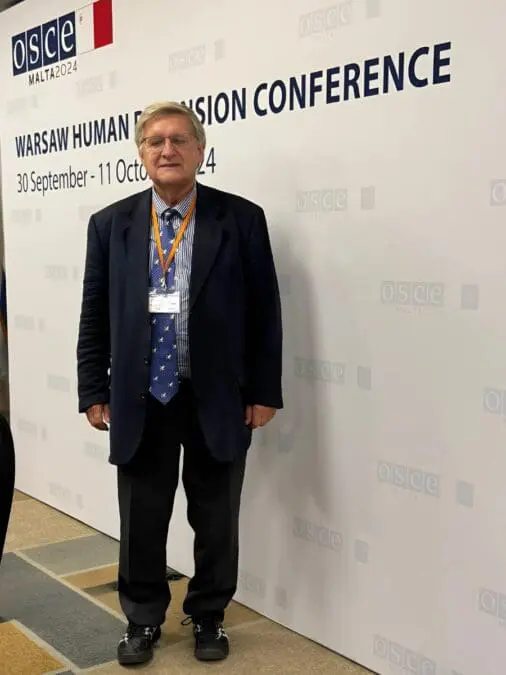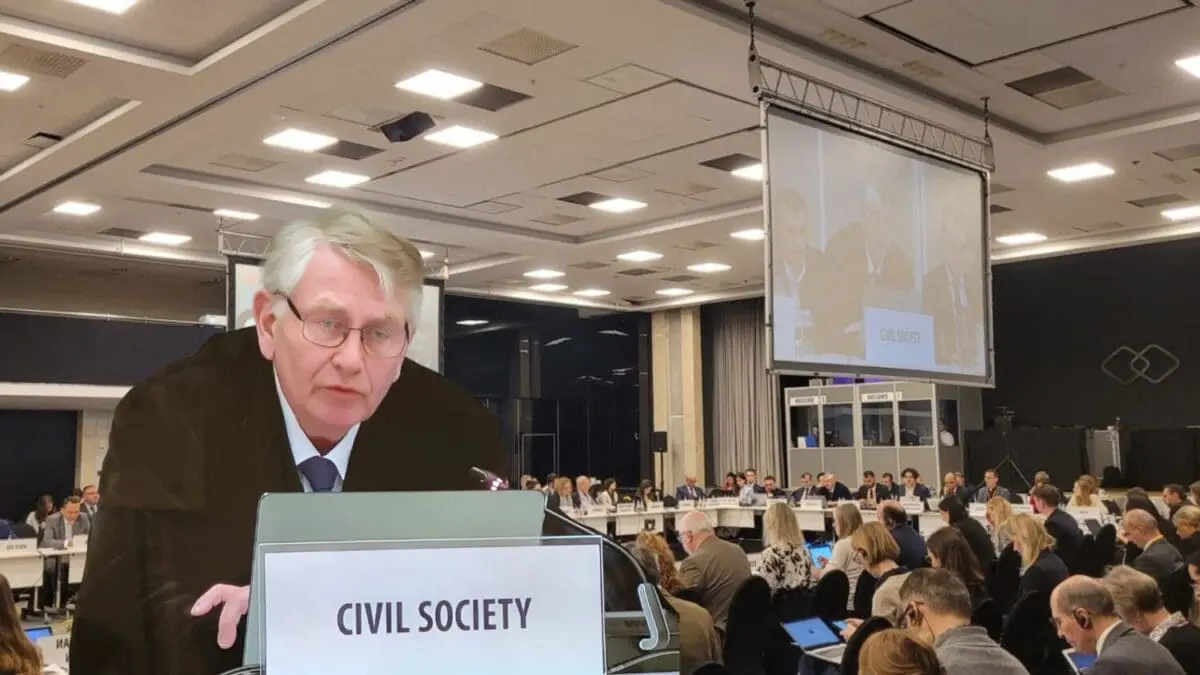Oral statement denouncing the discrimination by the Dutch branch of Human Rights Without Frontiers at the OSCE Warsaw Human Dimension Conference on 7 October
“Mensenrechten Zonder Grenzen Nederland is deeply concerned about a decision in Norway which arbitrarily revoked the registration of Jehovah’s Witnesses present in the country for over 130 years. This measure puts an end to their eligibility for state grants they had received for 30 years.
The registration of the Norwegian Jehovah’s Witnesses as a religious organization for 39 years was put to an end on unclear and controversial grounds in 2022.
In addition, on 4 March of this year, the Oslo District Court upheld the decisions of the County Governor of Oslo and Viken who has denied Jehovah’s Witnesses state subsidies since 2021. The financial loss is estimated at 1.6 million EUR for 2021. An appeal has been lodged.
We recommend that the Government of Norway
- cancel the discriminatory decision to remove the registration of Jehovah’s Witnesses as a religious community;
- reconsider and reverse the denial of state grants since 2021;
- abide by their commitment to uphold fundamental freedoms guaranteed by the Constitution of Norway, the ICCPR and the European Convention on Human Rights for all citizens, including Jehovah’s Witnesses.
State subsidies in Norway are not a gift. The Lutheran Church of Norway which is a state church is financially supported by the government and gets state subsidies proportional to the number of its members. For the sake of coherence and non-discrimination, the Constitution mandates that other religions should also benefit from the same financing system and get subsidies in proportion of the number of their members. Over 700 religious communities receive such state grants in Norway, including Orthodox parishes subordinated to Patriarch Kirill of Moscow who blessed Russia’s war on Ukraine.”
Background information
Jehovah’s Witnesses go to trial against Norway after state registration is revoked
Source: Religion News Service (16.01.2024)
With its recognition of more than 700 registered faith communities, Norway is often admired as a bastion of religious freedom. But after Norway deregistered the Jehovah’s Witnesses last year, some human rights experts say that reputation could be in question. Now, the Jehovah’s Witnesses of Norway are suing the state for revoking their national registration and withholding state funds. According to Jehovah’s Witnesses, they are the first religious group to lose their national registration in Norway.
The trial, which began Jan. 8, 202 will determine whether some practices of the Jehovah’s Witnesses violate Norway’s Religious Communities Act or whether withdrawing the Jehovah’s Witnesses’ registration violates their right to freedom of religion and freedom of association, as guaranteed in the European Convention on Human Rights.
 OSCE 2024″ class=”wp-image-157549″ style=”width:303px;height:auto”/>
OSCE 2024″ class=”wp-image-157549″ style=”width:303px;height:auto”/>“It’s certainly the most important trial about a religious freedom issue in Norway in decades,” Willy Fautré, director of the Brussels-based organization Human Rights Without Frontiers, told Religion News Service.
In January 2022, Valgerd Svarstad Haugland, the county governor of Oslo and Viken, in Norway, denied Jehovah’s Witnesses state grants for the year 2021 in response to concerns about what she perceived as exclusionary practices. The Jehovah’s Witnesses had received the grants, which currently amount to around $1.5 million annually, for three decades. These funds are typically used for international disaster relief work and supporting religious activity in Norway, including translating literature and building kingdom halls, according to Jørgen Pedersen, spokesperson for Jehovah’s Witnesses in Norway.
In an announcement originally written in Norwegian, the county governor of Oslo and Viken claimed that Jehovah’s Witnesses are forbidden to contact disfellowshipped members, as well as people who voluntarily dissociate, which can hinder a person’s ability to freely withdraw from the group. She also argued that Jehovah’s Witnesses may disfellowship children who have chosen to be baptized if they break the religious community’s rules, a practice she said constituted “negative social control” and violated children’s rights. These practices, the county governor argued, defy Norway’s Religious Communities Act. “We have assessed the offenses as systematic and intentional, and have therefore chosen to refuse grants,” the press release said.
In an email to RNS, Jehovah’s Witnesses spokesperson Jarrod Lopes said Witnesses only disfellowship an unrepentant member who “makes a practice” of serious violations of “the Bible’s moral code.” Even then, Lopes added, Jehovah’s Witnesses don’t force members to limit or cease association with former congregants, whether they’ve been disfellowshipped or withdrawn voluntarily — that’s up to individuals. “Congregation elders do not police the personal lives of congregants, nor do they exercise control over the faith of individual Jehovah’s Witnesses,” wrote Lopes.
Pedersen added that the serious sins that might lead to disfellowship include manslaughter, adultery and drug use. He said a congregation will always try to help an individual restore their relationship with God, but if the problem persists, Jehovah’s Witnesses feel compelled to respect the entire Bible, including instructions to not associate with unrepentant sinners, such as 1 Corinthians 5:11.
Though the Witnesses appealed the county governor’s decision, in September 2022 the Ministry for Children and Families upheld the ruling. In October that same year, the county governor said in a press release that unless Jehovah’s Witnesses would “rectify the conditions that led to the refusal of state subsidies,” they would lose registration, which they did a few months later, in December. Without its national registration, Jehovah’s Witnesses cannot perform marriages, and they lose entitlement to government grants.
The Jehovah’s Witnesses of Norway filed two lawsuits against the state in December 2022: one challenging the denial of state grants and another challenging their loss of registration. Those lawsuits have since been combined. Though the Oslo District Court initially granted the Jehovah’s Witnesses an injunction that suspended their deregistration until that case was argued, the Ministry challenged the injunction, and in April 2023, the court removed it.
As the trial plays out at the District Court of Oslo, Jason Wise, an attorney who is acting as a consultant on the case for the legal team representing the Jehovah’s Witnesses in Norway, said part of the Witnesses’ argument is that there is no evidence of harm and that it’s not the place of the state to interpret religious texts. The state continues to contend that the Jehovah’s Witnesses’ practices are in conflict with the Religious Communities Act, particularly, they claim, by exposing children to psychological violence.
Since 2022, Jehovah’s Witnesses have reported an increase in vandalism, harassment and physical assaults in Norway. In September 2022, two Jehovah’s Witnesses in Harstad, Norway, reported that a man screamed at them and repeatedly attempted to hit one of them. That same month, a man in Kristiansand, Norway, reportedly set a Jehovah’s Witnesses mobile display car on fire, and a month later, someone attempted to set fire to a Jehovah’s Witnesses meeting place in Fauske, Norway.
Norway isn’t the only place where Jehovah’s Witnesses’ practices have been under scrutiny. In December, the Belgian Court of Cassation — the highest court in the Belgian judiciary — rejected an appeal of a lower court’s decision, ruling in favor of Jehovah’s Witnesses’ right to avoid contact with former members. “Norway is just the tip of another phenomenon. That is a source of concern, because we see that there are more and more attempts in Europe by state institutions to interfere and intrude into the teachings and practices of religious groups, which is forbidden by the European Convention,” said Fautré. “The risk is they would open the door to more court cases against other religious groups.”






